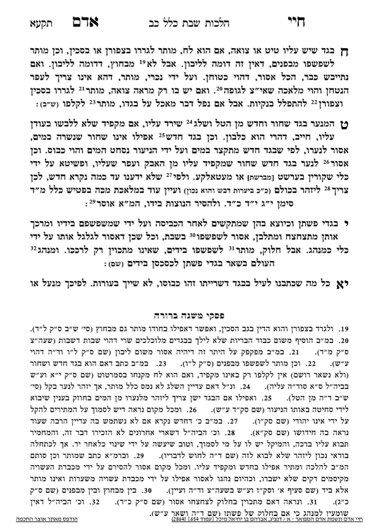We are continuing in siman 9. We mentioned the opinion of the Shulchan Aruch, that the Gemara is referring to a dark, new garment which became wet through a liquid, and the Gemara is teaching that merely shaking off the liquid is assur due to libun. However, Rashi says that the Gemara is referring to shaking off a garment which has dust on it. Rashi agrees with the Shulchan Aruch that if it does not bother the person that the garment is dusty, it is not assur. For example, picture the difference between a brand new black hat and a hat which has already begun to fade. One is makpid on the new black hat, but not the old one.
Even though this dust is not removed with water or with rubbing it, it is still assur. The Chayei Adam adds that certainly, using a brush or rag is certainly assur, since it is akin to rubbing the garment.
The Mishnah Berurah points out that since the Shulchan Aruch does not understand the Gemara in this manner, according to the Shulchan Aruch, this case may not exist. Nevertheless, halacha lemaaseh this case applies to Ashkenazim, as the Rema quotes Rashi that one is chayiv if the brush off such a garment.
Hence, It is a machlokes whether this case (removing dirt without water or rubbing) is assur mideoraysa( Rashi, Rema)or miderabanan( or even muttar, Shulchan Aruch). Therefore, in regards to amira l’achum, the Mishnah Berurah writes that one can rely on the Shulchan Aruch and ask a non-Jew to perform the melacha, due to kavod habriyos.
The Mishnah Berurah points out that according to Rashi, that it is assur to brush the dust off of a new, dark garment, one should not place the garment in a place where it will gather dust, as they may be tempted to brush it. For example, one should be careful not to place their hat in a place where it is dusty, such as a hat rack. One should check and clean the rack before using it.
Halacha lemaaseh, one cannot brush their hat on Shabbos, as we assume that most people are still makpid on the appearance of their hat, so it is a tikkun to clean it.
The Chayei Adam points out that it is unclear what Chazal meant when they limited this issur to a “new” garment, so one should be makpid on a garment in any condition. The Mishnah Berurah points out that, other than the Chayei Adam, no other achronim make this point about the definition of new. Therefore, one can rely on the other opinions, that a person can decide when a garment is no longer new, but lechatchilla, one should be machmir for the Chayei Adam. If one is being machmir, they could ask a non-Jew to perform the melacha.
Summary
- It is assur to shake a liquid out of a garment if the owner will not use the garment, or feel the garment is damaged, without its removal
- According to Ashkenazim, it is assur to remove the dust from a new, dark garment. One can ask a non-Jew to perform the melacha.
- The definition of “new” is unclear, so the Chayei Adam writes that one should be makpid on all condition clothing, but the Mishnah Berurah writes that one can use their judgement.
- One should avoid putting a garment in a place in which they will be tempted to brush it.



